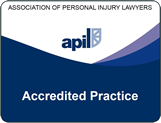This week marks Mental Health Awareness Week, dedicated to acknowledging individuals suffering with their mental health and empowering everyone with strategies to manage their mental well-being.
Each year The Mental Health Foundation sets a theme for Mental Health Awareness Week. In 2024, it is all about ‘Movement: Moving more for our mental health’.
So, why is moving important? Physical activity plays a huge role in supporting our mental health. Through exercise, our bodies release ‘endorphins’ which some people refer to as ‘happy hormones’ as they improve our mood. In fact, a Burnout Report published by Mental Health UK, found that 56% of adults said that they managed stress and prevented burnout by exercising regularly.
The effect of personal injuries on mental health
We’ve talked about how movement is beneficial to our mental health, but what about those of us who have physical limitations?
Experiencing a personal injury is undeniably one of life’s most challenging ordeals. Accidents occur unexpectedly, and their consequences are entirely beyond our control. The shock and unpredictability of personal injuries can instil feelings of anxiety, as individuals grapple with concerns about recovery, the possibility of similar accidents occurring again, and the profound impact on their lives in both the short and long term.
For many, a serious injury heralds a life-altering adjustment, forcing individuals to adapt their lifestyles to accommodate their newfound limitations. The sudden loss of independence can precipitate feelings of depression and other mental health struggles as individuals strive to navigate and cope with their changed circumstances.
It’s crucial to prioritise your mental well-being in the aftermath of a personal injury. While the term “personal injury” commonly brings to mind physical harm, it’s important to recognise that psychological injuries carry significant weight as well. If you experience conditions such as PTSD, severe anxiety, depression, or an adjustment disorder following an injury, you may be eligible to seek compensation for the psychological impact in addition to any physical injuries sustained.
Moving for Mental Health Awareness Week
This Mental Health Awareness Week, the focus is on discovering ways for individuals of all ages and abilities to engage in physical activity. While exercise often conjures images of lifting weights at the gym or running a marathon, Mental Health Awareness Week aims to expand this perception. It is all about broadening our concepts of exercise to include various forms of movement, particularly small adjustments that can significantly improve your health and well-being. This could be taking a walk outside for the first time in a while, popping some music on and dancing in the kitchen, swimming or even stretching – all movement matters!
Exercise looks different to everyone, so it is important that you don’t compare yourself to others. Following a personal injury, you might receive tailored exercises from doctors or physiotherapists to aid in your recovery. However, if this isn’t the case and you’re experiencing low mood after your accident, there are several ways to prioritise your mental well-being while working on improving your physical health:
Acknowledgement: Everybody starts somewhere, celebrate your wins and be kind to yourself. Track your progress and make note of any improvements you are making both physically and mentally.
Work out with a friend: If you’re feeling apprehensive about exercising or simply don’t find it enjoyable, consider inviting a friend to join you! Having a workout buddy can provide support, boost motivation, and encourage consistency in your exercise routine.
Set realistic goals: Overcommitting yourself can lead to disappointment if you’re unable to meet your expectations. Recognise that some days will be more challenging than others, and modify your exercise routine accordingly to prevent burnout.
Discover what suits you best: Getting active can feel like a chore if you’re not enjoying it, so explore activities that resonate with you. If you appreciate nature, perhaps try cycling; if you’re passionate about music, consider joining a dance class. Remember, exercise can be enjoyable!
Build healthy habits: Both rest and consistency play crucial roles in maintaining a balanced routine. If you feel fatigued after exercising, prioritise adequate rest and recovery time. Beyond physical activity, ensure you’re getting enough sleep, staying hydrated, and consuming a nutritious diet to alleviate symptoms affecting both your mental and physical well-being.
Stonehewer Moss are here to help
Following an accident, life can abruptly grind to a halt, leaving you uncertain about your next steps. Determining whether you have a valid claim for compensation for your psychological injuries can be challenging, especially when navigating the process alone.
You may find yourself with various questions:
– Do I have a valid claim for psychological injury?
– What steps are necessary to pursue such a claim?
– What options are available to me?
– How can I gather evidence to support my case?
Enter Stonehewer Moss—a team of specialised Personal Injury solicitors recognised by the Association of Personal Injury Lawyers (APIL). We understand the complexities of psychological injury claims and are dedicated to providing clarity, expertise, and compassionate support throughout the legal process
Our solicitors are committed to ensuring you receive the maximum compensation for your psychological injuries. With a free, no-obligation consultation and impartial legal representation on a No Win, No Fee basis, you can rely on the help of Stonehewer Moss without worrying about financial risks.
To learn more about No Win No Fee claims, watch this short video.
Talk to our claims solicitor
Call us on freephone 0800 434 6544 or 01606 87 22 00
Email us at info@stonehewermoss.co.uk


